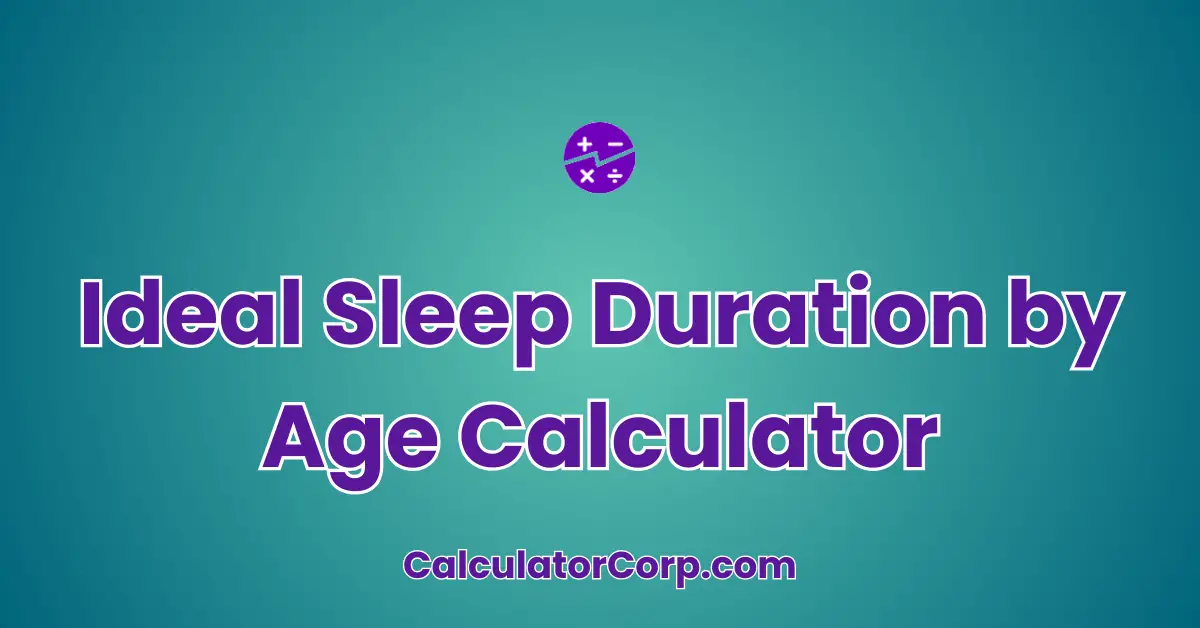The Ideal Sleep Duration by Age Calculator helps you determine the optimal amount of sleep based on your age group. Sleep plays a critical role in maintaining overall health, supporting physical recovery, cognitive function, and emotional well-being. Use this calculator to understand your sleep needs and make adjustments to your schedule for a healthier lifestyle.
Ideal Sleep Duration by Age
Find out how much sleep you need for optimal health and well-being.
How to Use Ideal Sleep Duration by Age Calculator?
Using the Ideal Sleep Duration by Age Calculator is straightforward. Follow these steps to get accurate results:
- Field Explanation: Enter the age of the individual in the input field. This represents the age in years.
- Result Interpretation: Once the calculation is complete, the result will display the recommended amount of sleep for the entered age. For example, if you enter an age of 16, the calculator will suggest 8-10 hours of sleep.
- Tips: Ensure the age is entered correctly. Avoid typing non-numeric characters, which could lead to inaccurate results.
Backend Formula for the Ideal Sleep Duration by Age Calculator
The formula used in this calculator is based on general sleep guidelines provided by health organizations. Here’s a breakdown:
- Age Ranges: The calculator considers standard age brackets to determine sleep needs, such as infants, toddlers, children, teenagers, adults, and seniors.
- Sleep Duration: Each age group has a recommended sleep duration range, ensuring that the calculation accommodates varying individual needs.
Illustrative Example: If the age entered is 4, the calculator translates this to the ‘3-5 years’ bracket, recommending 10-13 hours of sleep. Variations exist but are minimal, as the formula is designed to be comprehensive.
Step-by-Step Calculation Guide for the Ideal Sleep Duration by Age Calculator
Let’s go through the process step by step:
- Input the Age: Start by entering the age of the person whose sleep you are assessing. This is crucial as it determines the output range.
- Calculate: Press ‘Calculate’ to see the sleep duration. This step uses the age to match a predefined sleep range.
- Example 1: For age 10, the result shows 9-11 hours. This means children in this age group generally need this amount.
- Example 2: For age 30, the output is 7-9 hours, reflecting typical adult requirements.
Common Mistakes include entering an invalid age or misunderstanding the output as a strict requirement rather than a guideline.
Real-Life Applications and Tips for Ideal Sleep Duration by Age
This calculator has a wide range of applications:
- Short-Term Use: Determine appropriate sleep schedules for upcoming events or changes in routine.
- Long-Term Use: Adjust daily habits to improve overall sleep quality over time.
- Professional Use: Healthcare providers can use it to educate patients on the importance of sleep.
Practical Tips:
- Ensure data is accurate before inputting.
- Be aware of how rounding might affect sleep duration ranges.
- Use results to plan sleep schedules or set health goals.
Ideal Sleep Duration by Age Case Study Example
Meet Alice, a busy mother of two. Concerned about her children’s health, she uses the calculator to establish appropriate bedtime routines. Her 3-year-old, needing 10-13 hours, starts going to bed earlier. Her 10-year-old, needing 9-11 hours, also adjusts.
After implementing these changes, Alice notices improved mood and school performance in her children, validating the calculator’s recommendations.
Alternative Scenarios: Professionals like nurses or school counselors can also use the calculator to advise others on healthy sleep patterns.
Pros and Cons of Ideal Sleep Duration by Age
Pros:
- Time Efficiency: Quickly provides sleep duration recommendations without needing extensive research.
- Enhanced Planning: Users can organize daily routines around optimal sleep schedules.
Cons:
- Over-Reliance: Solely depending on the calculator can ignore individual needs or conditions.
- Estimation Errors: Inputting incorrect age may lead to inaccurate suggestions.
Mitigating Drawbacks: Always consider personal health factors and validate findings with healthcare professionals.
Example Calculations Table
| Age | Recommended Sleep Duration |
|---|---|
| 6 months | 14-17 hours |
| 2 years | 11-14 hours |
| 8 years | 9-11 hours |
| 15 years | 8-10 hours |
| 45 years | 7-9 hours |
Patterns show that as age increases, the recommended sleep duration generally decreases. This reflects the body’s changing needs over a lifetime.
Glossary of Terms Related to Ideal Sleep Duration by Age
REM Sleep: A phase of sleep characterized by rapid eye movements, where dreaming usually occurs. Essential for cognitive functions.
Sleep Cycle: The progression through various stages of sleep, including light sleep, deep sleep, and REM, in a typical pattern lasting about 90 minutes.
Circadian Rhythm: The body’s natural 24-hour cycle that regulates sleep and wake patterns, influenced by external cues like light.
Frequently Asked Questions (FAQs) about the Ideal Sleep Duration by Age
Q: Why does sleep duration vary by age?
A: As individuals grow, their physiological and developmental needs change. Infants require more sleep for growth, while adults need less but more restorative sleep.
Q: Can sleep duration affect health?
A: Yes, both insufficient and excessive sleep can lead to health issues such as obesity, cardiovascular disease, and mental health disorders.
Q: Is it okay to sleep less than recommended?
A: Occasional variation is normal, but consistently sleeping less than recommended can impact health and well-being. Consult a healthcare provider if issues persist.
Q: How can I improve my sleep duration?
A: Establish a regular sleep schedule, create a restful environment, and limit exposure to screens before bedtime.
Q: Are naps beneficial?
A: Short naps can be refreshing, but long or irregular napping may interfere with nighttime sleep.
Further Reading and External Resources
National Sleep Foundation: How Much Sleep Do We Really Need? – Comprehensive guide on sleep needs across different ages.
CDC: Sleep and Sleep Disorders – Information on sleep health and disorders from the Centers for Disease Control and Prevention.
Mayo Clinic: Sleep Tips – Expert advice on improving sleep habits for better health.

